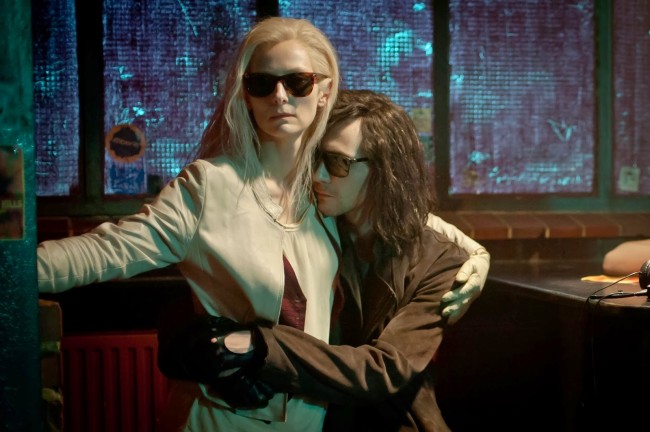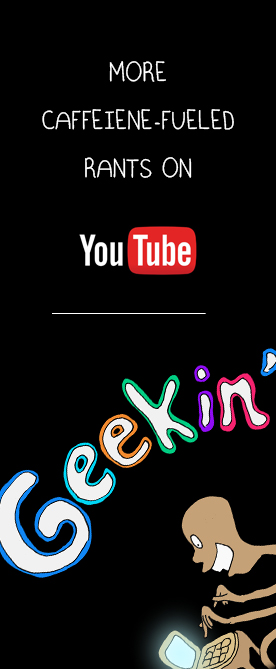Only Lovers Left Alive
dir. by Jim Jarmusch
Adam and Eve relate better to the stars than they do to the people around them—and yes, by stars I mean those gaseous balls of flame that twinkle from millions of light years away, and not your Sandlers and your Smiths. Like stars, Adam (Tom Hiddleston) and Eve (Tilda Swinton) understand the true significance of cyclical brevity. Life plays like a vinyl record. You think you’re moving forward—with verse and hook and chorus, with chords and progression—but it’s nothing more than world-weary deception; despite your forward movement through the temporal, you still spin round and round in physical place. What attracts our aptly-named married vampires more than anything else—even more than blood—is the idea of ever-lasting posterity. Their concerns lie with the soul and how it survives beyond the normal, mortal parameters of life; if it can, in fact, live on without the body as its vessel. One of their main confidantes and most cherished friends Christopher Marlowe (John Hurt), the 16th-century dramatist rival to Shakespeare, acts as testament to Adam end Eve’s fondness for those who transcend the earthly for a greater ineffability.
That’s the crux and kernel of why Adam and Eve so firmly believe in their everlasting love.
Adam lives in Detroit. Eve in Tangier. They live a globe apart, but still love and miss each other. Adam’s lived long enough to understand that the world is a dark and remorseful place full of constant dissatisfaction. Eve, on the other hand, has lived long enough to know that human existence cycles up and down, up and down, like the wheel of Fortune, dumping upon us its fair share of plagues and genocides—but! amidst all that dreck, there’s still life, friendship, and knowledge to be cultivated. There’s dancing to be done! Eve embraces this never-ending loopiness of life by dancing and spinning in place as the camera hangs over her with a bird’s-eye view. She dances and smiles, fully embracing the circular nature of existence, while Adam mopes and shuts himself in as a recluse in one of the world’s most desolate cities. Adam is a musician with a sound awfully similar to that of a funeral’s dirge, and he tinkers with his music like a painter dabbing and flicking his blank canvas, smearing and adding little detailed effects, savoring every speck of minutia of this smaller fictional world of his. He’s holed up in a reality of his own design. There are no variables there, only constants. Detroit is no longer alive, it’s dead, and will remain dead—a former titan of industry and legend. There’s no change in Detroit, and for the moment that appeals to Adam. One more shift in the wrong cultural direction, and the world may push Adam to end it all with a bullet made out of wood so dense it sinks in water: the modern vampire’s stake to the heart. It’s all quite grand and melodramatic, even for this ennui-stricken vampire.
It’s been far too long since someone’s made a film about vampires in order to address an issue more provocative than how young flesh drives us bananas with lust and irrational thought. That’s easy. We get it. There’s nothing revelatory about the thematic machinations of Twilight or The Vampire Diaries. Leave it to Jim Jarmusch—the fabulously tall-haired director who brought us such other nocturnal slow-burns as Night on Earth and Down by Law—to shake this beaten-to-death genre back to life…albeit, in his own slow, methodical way. Like any and every star in the universe, Only Lovers Left Aliveglows iridescently in your psyche long after it’s done and gone. It’s not till hours after the film’s finished, and its ritualistic voodoo has risen to take its hold, that you lament its ephemerality. Certain stretches of the film drag, especially everything that comes after Adam and Eve decide to flee the Motor City scene for Tangier, but that’s par for the course with any Jarmusch film. Thankfully, there’s much less drag here than Jarmusch’s earlier, more esoteric efforts like Permanent Vacation and Stranger than Paradise. And much of that has to do with the film’s two leads: Swinton and Hiddleston. More so the former, than the latter. Hiddleston holds his own and nails the landing just right as the prickly, pessimistic Adam, but there’s simply no working actor or actress out there who can rival Swinton’s ease with malleability.
What’s so miraculous about Swinton’s gift for performance is the rigidity of her facial features. Nothing about her black shark’s eyes, her high, chiseled cheekbones, her tight, pert lips, suggest chameleonic versatility. And yet, with vampiric swiftness, Swinton vanishes right before our eyes into the centuries-old soul of Eve and carries her with a jubilant jaunt and a smile forever cocked and loaded at the corner of her lips—a carefree whimsy afforded only to those who understand more than they let on. She’s vivacious, uninhibited, and totally indebted to the carry-on cases of prose and verse she lugs around with her wherever she goes. Classic literature—the type that’s cratered the international mindscape with meteoric indelibility—exists in a realm separate from time, as does Adam and Eve, which is what causes Eve to travel with her own personal library. She admires and respects them for their timelessness, their immortality. She sees them as a means of communication with her former peers—Lord Byron and the like. The same goes for Adam and his collection of instruments. What’s most befitting about Swinton’s casting in the role of an alabaster vampire is her face’s apparent immunity to time. The woman hasn’t aged in years. Her skin is milky smooth, and serene, nary a wrinkle upon her countenance. Her face is a face that belongs to the past just as it does the future; it’s staked to no one epoch, but all epochs. It’s a face that’s ridden the wheel of Fortune many times before—up and down, up and down—and knows that once you’ve swung down, there’s no where to go but up. Furthermore, because of this tried and true tenant: patience truly is the greatest virtue, and there’s no better way of conveying that than through the most controlled actress in film. Swinton knows when to move and how much moving needs to be done. No motion goes unchecked, unobserved, unanalyzed. Insight’s sole power source to her performances.
The film’s most invigorating moments—and, inversely, its most predictable—occur once the always brilliant Mia Wasikowska (Stoker, Alice in Wonderland) arrives in the form of Eve’s younger, wilder sister Ava. Her reputation harkens to us long before her physical appearance as everyone and their mother explains to each other that they’ve seen her in a portentous dream or two. Unlike her sister and sister’s husband, Ava can’t commit to her own devices, but instead relies on the world and its zeitgeist to shape her philosophies. Adam doesn’t like Ava, thinks her to be like all the other zombies—his unaffectionate term for the uninspired, the unorignal—or in other words: regular folk. Up until this point, the world established by Adam and Eve is so orderly—their love so steeped in bedrock—that Eva’s untimely appearance acts like an abrasion on their cloistered harmony.
Even though the scenes between Eve, Adam, and Ava prove to be the most charged with forward-propelling motion—most of which has to do with Wasikowska ability to exhilarate the audience with her irrepressible vitality—they pale in comparison to the more intimate scenes between Adam and Eve in bed or Adam and Eve gliding through the abandoned streets of Detroit, preying not on people and blood, but history and posterity. Jarmusch is a master at capturing the low-key beauty of people bumming around in a life-long pursuit of killing time, but still has no clue how to incorporate plot without halting the gears on pace. Ironically enough, plot is what typically kills a Jarmusch film.Only Lovers Left Alive is at its best when characters trade with one another their likes and dislikes, their world views, their knowledge for science and art, when they pass on jokes that only a strict movie freak would understand. The movie plays most intimately when it ventures for those hushed human moments of Adam and Eve entwined in each others’ limbs, coaxing each other out of sleep, or when Eve convinces Adam to dance with her after confronting him about his wooden bullet. Those are the moments that shuffle and sashay with the laconic energy we’ve come to associate with the greatest of Jarmusch films.
Hurrah! Now we can finally put the abstrusely self-indulgent The Limits of Control behind us! Welcome back to form, Mr. Jarmusch.






